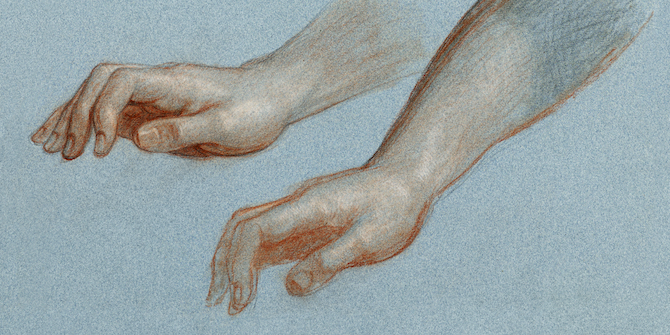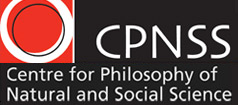Do we need to prove that we’re not living in a computer simulation? Jonathan Birch looks at G. E. Moore’s famous argument against scepticism.
I first encountered G. E. Moore’s hands as an undergraduate. At around the same time, I came across the “simulation hypothesis”, the hypothesis that we are living in a computer simulation. At the time, this idea was being taken surprisingly seriously by intelligent people. Yet if Moore’s arguments work, we know that we are not simulated. Moore’s arguments seem too simple to work, too good to be true – and perhaps they are. But is there still some value in them?
The radical sceptic argues:
Argument 1:
Premise 1: I don’t know that I’m not simulated.
Premise 2: If I don’t know that I’m not simulated, then I don’t know that I have two human hands.
Conclusion: I don’t know that I have two human hands.
The proposition “that I have two human hands” just stands in for any of a huge class of propositions that I ordinarily take myself to know – but actually don’t know, if I don’t know I’m not simulated. Simulated beings don’t possess human hands.
In “Certainty” (1959), Moore turns this argument on its head, arguing:
Argument 2:
Premise 1*: I know that I have two human hands.
Premise 2*: If I don’t know that I’m not simulated, then I don’t know that I have two human hands.
Conclusion*: I know that I’m not simulated.
Strictly speaking, Moore’s target in “Certainty” was a different sceptical hypothesis – the hypothesis that I’m dreaming – but we can replace the possibility that I’m dreaming with the possibility that I’m simulated. He also used a different piece of common-sense knowledge (“I know that I’m standing up”), although he famously talked about his own hands at some length in a different paper, “Proof of an External World” (1939).
Argument 2 seems to beg the question against a sceptical opponent. To “beg the question” in a narrow sense of the term is to include the conclusion of your argument among the premises – and Moore’s argument does not do that. But to “beg the question” in a broader sense is to rely on premises that someone initially unconvinced of your conclusion would never accept – and Moore’s argument clearly does do that. An opponent who seriously entertains the simulation hypothesis will not grant Moore the premise “I know that I have two human hands”.
So what is going on here? Moore, reaching the end (at that time) of a long and brilliant career, was not someone who would put forward a question-begging argument in a brazen attempt to deceive the reader. The argument formed part of a serious anti-sceptical strategy – a strategy that the bare argument, presented by itself, doesn’t really capture.
Moore is asking us to compare two arguments: Argument 1 and Argument 2. We are supposed to ask: Which is the better argument? Which is the more rationally compelling?
Both arguments are logically valid – the conclusion follows from the premises – so this is not something we can use to tell between them. Moreover, they have a premise in common (Premise 2 and 2*), so that premise does not give us any reason to consider one argument better than the other. We might try to fight the sceptic by arguing against that premise, but Moore doesn’t see that as a promising option. What Moore wants us to do is compare Premise 1 with Premise 1*.
Premise 1: I don’t know that I’m not simulated.
Premise 1*: I know that I have two human hands.
If one of these premises is better motivated than the other, then this gives us a reason to consider one argument better than the other. Moore’s key claim is this: Premise 1* is at least as well motivated as Premise 1.
Why is that? Moore considers various ways in which a sceptic might try to motivate Premise 1. They might point out that it’s logically possible (i.e. not self-contradictory) that I’m simulated. But this does nothing to motivate the premise, since a proposition can be logically possible yet known to be false. Even a sceptic will usually grant this. For example, it’s logically possible for me to be feeling intense pain right now, but I know I am not. Perhaps the sceptic will say “I just meant that it’s epistemically possible – compatible with everything you know.” But this is not motivating the premise either. It’s just reasserting it in different words.
They might rely on the idea that I can’t prove I’m not simulated. There’s no “smoking gun”, no proof. But this is question-begging against an opponent, like Moore, who thinks there can be knowledge without proof. Moore can easily match this by giving an equally question-begging rationale for Premise 1*, such as: I know by immediate inspection that I have two hands, and it’s a piece of common-sense knowledge that I’m human, so I know that I have two human hands.
What else might the sceptic say to motivate Premise 1? Well, they could offer an empirical rationale for their premise, based on providing lots of scientific detail about computer simulations, and how powerful they are likely to be in the future, and how easy it will be for an advanced civilization to simulate me. This is a popular option. It’s the type of rationale Nick Bostrom gives in “Are You Living in a Computer Simulation?“.
The trouble with any such rationale is that it presupposes that we know a great deal about the external world, including facts about the fundamental laws of physics. This presupposition, once articulated, supports Moore’s Premise 1*, not the sceptic’s Premise 1. So empirical rationales for Premise 1 cannot be genuine rationales – they feel like good rationales, and they can have a lot of persuasive force, but they don’t have any rational force for a reader who teases out their underlying presuppositions.
What else might the sceptic say? Well, their third option is to simply double-down and insist on the intuitive plausibility of Premise 1. They could say: no explicit rationale is really needed, because it so intuitively plausible. But to this Moore can say: in the absence of any further rationale, Premise 1* is at least as plausible. If anything, it’s more plausible.
Perhaps there is some other way of motivating Premise 1 that we haven’t considered. But Moore’s point is that we should really demand some motivation better than those considered above, before concluding that Argument 1 is a better argument than Argument 2. Until such a motivation is provided, we should regard Argument 2 as at least as good as Argument 1.
So Moore has achieved something here. What he has not achieved is a cogent, non-question-begging argument for rejecting the simulation hypothesis – an argument that a reader initially willing to entertain the hypothesis would find rationally compelling. But this may be too much to ask.
What he has done is argue the sceptic to a kind of stalemate, or score-draw. He has shown that, for any sceptical argument of the usual “Argument 1” form, there is a mirror image argument of the “Argument 2” form that is at least as rationally compelling. A score-draw doesn’t give us everything we want from a response to scepticism, but it shows we are not rationally compelled to accept the sceptic’s argument or its conclusion.
Dr Jonathan Birch is an Associate Professor of Philosophy at the LSE and Principal Investigator (PI) on the Foundations of Animal Sentience project. In addition to his interest in animal sentience, cognition and welfare, he also has a longstanding interest in the evolution of altruism and social behaviour.
Further reading (Moore)
- Moore, G. E. (1939). “Proof of an External World”, Proceedings of the British Academy 25, pp. 273–300.
- Moore, G. E. (1959). “Certainty”, in his Philosophical Papers. London: George Allen & Unwin. Based on the Howison Lecture delivered at University of California at Berkeley in 1941.
Further reading (more)
- Birch, J. (2013) “On the ‘Simulation Argument’ and Selective Scepticism”, Erkenntnis 78:95-107.
- Bostrom, N. (2003) “Are We Living in a Computer Simulation?” Philosophical Quarterly 53:243-255.
- Lycan, W. G. (2019) “Moore Against the New Sceptics”, Ch. 2 in his On Evidence in Philosophy. Oxford: Oxford University Press.
- Weatherall, J. O. (2017). “On G. E. Moore’s ‘Proof of an External World”, Pacific Philosophical Quarterly 98:219-250.
Featured image: Study of Angel’s Hand for “Mercy’s Dream” (1857) by Daniel Huntington / Public Domain





…except that colour blind persons don’t know they are colour blind until someone informs them, and even then, since the perception of colour is in the brain, not actual perceived reality, the very premise of a physical world manipulator such as “hands” to prove ‘not simulated’ is ridiculous, as the brain converts the world into something we can understand.
For anyone interested, there was a fairly robust discussion on this blog post over on Reddit on the r/philosophy sub-reddit.
https://www.reddit.com/r/philosophy/comments/j2j3cu/g_e_moores_hands_argument_against_radical/
I argue in a paper that came out last year in Phil Studies that the problem for Moore is that his same argument strategy permits lots of incompatible proofs depending on what metaphysical assumptions one takes to be part of one’s “common sense”. The idealist will hold up two “hands” to prove there is an immaterial world, and the virtualist will hold up two “hands” to prove we live in a virtual world. I analyze the problem in terms of the theory ladenness of observation.